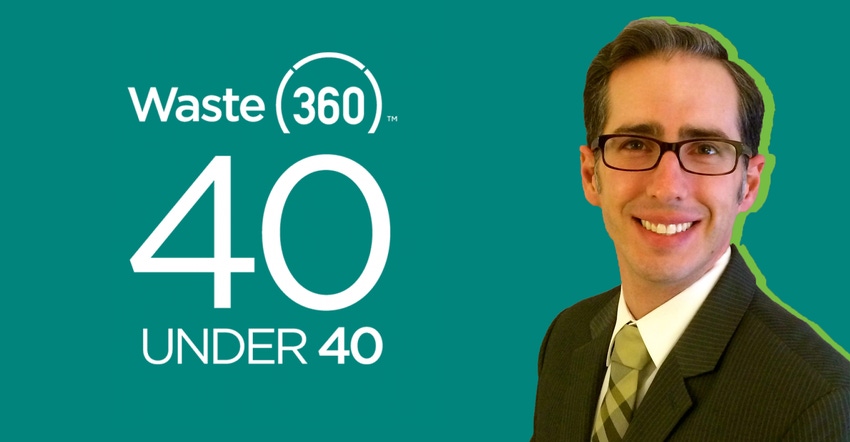
Josh Mann, Public Sector Solutions Manager with Waste Management, serves as team lead of the municipal sales team covering portions of Kern, Los Angeles, San Bernardino and Inyo counties in California. Mann, who is an expert relationship builder and a connector, was named as a Waste360 40 Under 40 award recipient earlier this year.
For this interview, he spoke with Waste360 about his experience working with municipalities to implement new recycling and organic waste programs and helping them to meet their waste diversion goals.
What is your current role and what are your major responsibilities?
Josh Mann: As the Public Sector Solutions Manager here in Southern California, I design and manage municipal collection programs for our franchise customers. My role is really to take our experienced resources and capabilities as a company and marry that with the needs and goals of the communities that we serve in terms of waste and recycling.
I would call it a Swiss army knife position within the company in the fact that you have to know a lot about the business, certainly the industry and capabilities, and also the communities that we serve.
Waste360: Would you consider an important part of your position to be relationship building?
Josh Mann: Definitely. Oftentimes, the role I play is as being an advocate for the company to the community and an advocate for the community inward to the company. It's very much about relationships, and ensuring that information gets communicated, and that our customers know what services they have available to them.
Waste360: What are some recent initiatives or programs that you've been working on that you feel have had an impact on communities that you serve?
Josh Mann: Probably the largest or most wide sweeping change that we've seen here in California is that we're taking a very hard look at the portion of the waste stream that is organic. The state of California is really driving change within that space to see what is a higher and better use of that material rather than continuing to send that to landfills. The result of that, most recently, has been Assembly Bill 1826, which has a focus on commercial organic waste.
If there's an opportunity where [food] is still edible, still usable, to try and get that donated, we work with food banks and soup kitchens and grocery programs. If it's able to be transported, it’s about finding a better home for those usable organics. For anything that would be truly scrapped, something that ultimately would otherwise go to a landfill, it’s about making sure that we work with the business to get that material separated out from the regular waste stream into a separate container, and then get that collected and transferred to a composting facility. Or we're seeing more and more anerobic digestion opportunities that are popping up. We're using that organic waste in a positive way.
It's been a big change, especially, I think, for the grocery and the restaurant industries. In a lot of ways they may have been doing that voluntarily, on their own, but now that there's a regulation to comply with, we are helping to make sure that whatever program they may have had in place is compliant with those regulations.
For those that may be just starting out, it’s helping them design a program that's appropriate for their type of business, and then, ultimately, standing that up citywide as the regulations come into play so that there are tiers of compliance.
Waste360: Your company is working to develop waste management solutions for the cannabis industry. What are some of the issues or special considerations that may come along with that?
Josh Mann: Here, in California, we choose to allow for cannabis cultivation, manufacturing and sale, and, in my area, I'm working closely with those jurisdictions to develop collection programs. It's been an exciting challenge, but it's great to see, certainly in this industry, new opportunities for recycling.
Waste360: What is something that you really enjoy about the work that you do?
Josh Mann: Trying to be a good community partner, being involved in community events and working with community groups to be good stewards of the environment. Whether that's things like community cleanups or community gardens, those opportunities come across my desk. You are really getting to see, in real-time, the positive impact that a company gets to make on the communities that it serves, and I get to work really hands-on.
I sit on the board of our local Boys and Girls Club, helping the kids [have] a positive environment to go to and be included in the community. It's just really rewarding to see all of that come together. That’s the great part about my job. As detailed as things get, in the scheme of things, I can see the rewards of the work that I do.
Waste360: Is there anything that I didn't ask you about that you would like to mention?
Josh Mann: I wanted to mention NWRA’s Future Industry Leaders Alliance and say, that for folks that may be just starting out in the industry, there is really a lot of great support and educational opportunities through the group. I was glad that, early on, I had an opportunity to join and be a part of it. The opportunities that I've had to expand my knowledge base and interact with other people in the industry has been part of my success.
About the Author(s)
You May Also Like


